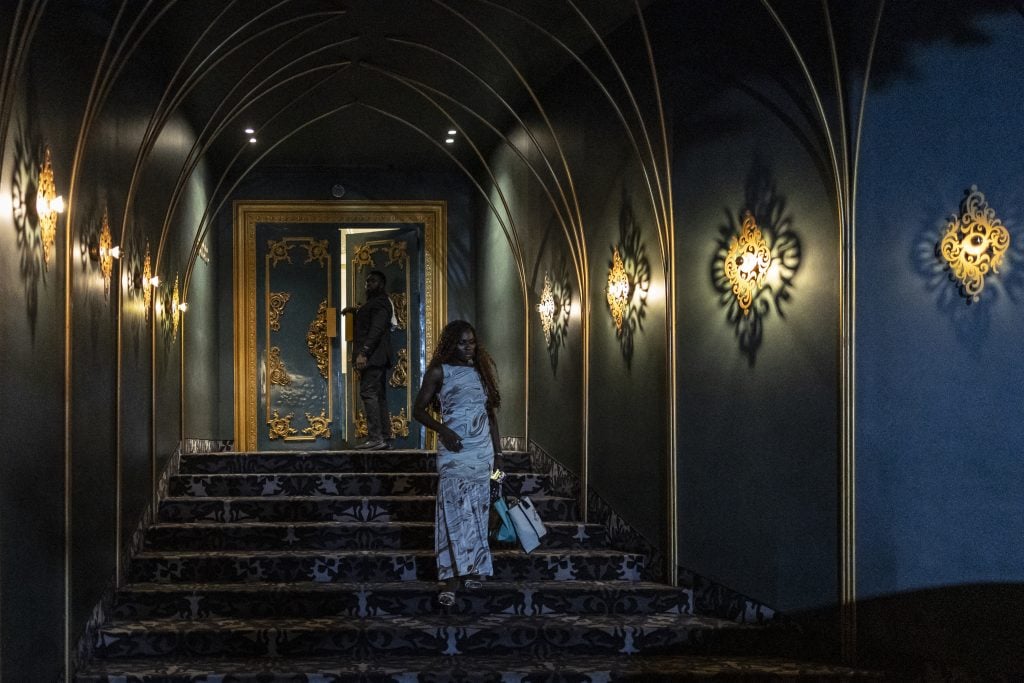On the banks of the Jukskei River simply north of Johannesburg in South Africa, lies the unique Dainfern Golf Property. This luxurious gated complicated, inbuilt 1992, incorporates over a thousand elite houses that supply residents a sanctuary of safety and class near South Africa’s business hub. Since its completion it has remained a perennial favorite with rich overseas patrons eager to snap up luxurious properties in South Africa, however during the last thirty years it has additionally counted Zimbabwean billionaire Try Masiyiwa, Nigerian pastor Chris Oyakhilome and Springboks rugby participant Joost van der Westhuizen as residents.
“In areas like Fourways and Midrand, African HNWIs [high-net-worth individuals] are desirous about gated estates for safety, way of life and comfort,” says Andrew Golding, chief government of the Pam Golding Properties group. “In Johannesburg, luxurious houses in leafy Westcliff, Dunkeld and Melrose have evergreen attraction for African patrons.”
Johannesburg is town with the best focus of wealth throughout the entire continent, with wealth primarily concentrated in a number of suburbs. Westcliff’s abundance of mansions designed by colonial architect Herbert Baker – which comprise gardens and panoramic views – is one such enclave.
“Whereas we’ve got at all times seen demand for luxurious residential property amongst patrons throughout the African continent, this pattern has elevated significantly in recent times,” says Golding. “We obtain robust enquiries out of Kenya, Ghana and Nigeria, and over latest years patrons from Zimbabwe, the DRC, Zambia, Malawi and Angola, have grow to be extra prevalent.”
As wealth creation diversifies, the variety of intra-African patrons of luxurious properties is growing, with vital curiosity, Golding notes, from different nations, together with Zimbabwe, Angola and the DRC. They’re as prone to construct fortunes in blockchain or crypto as they’re in additional conventional industries reminiscent of oil and mining.
This newer clientele tends to be youthful, with a worldwide outlook and ambition, and so they search luxurious property not solely as a hub for his or her households and kids, however as helpful property, and a approach to shore up their legacy and future-proof their wealth.
“These houses are seen as everlasting bases, whether or not for enterprise journey, schooling, or leisure,” says Golding. “Some households will relocate to enrol their youngsters in Johannesburg’s high faculties whereas sustaining enterprise operations throughout the continent. Typically, we discover that African and South African HNWIs have comparable preferences, with safety, way of life and placement all key priorities when buying a property.”
New wealth hubs emerge
Not confined to conventional definitions of wealth and success, Africa’s new rich elite are making strategic, legacy-driven choices not solely about the place they stay, but in addition how they stay.
Lux Afrique Boutique is a multi-brand luxurious e-commerce platform that serves this numerous and rising clientele. Specialising within the costly, distinctive and opulent, its wares vary from watches to furnishings and instances of wines, and it ships to all nations on the continent.
“Over the previous few years, we’ve seen a rising consumer illustration from Western and Southern Africa, particularly Nigeria and South Africa… in addition to the remainder of Africa, extra particularly Angola, Algeria, Kenya, Morocco, Côte d’Ivoire, Namibia and Zambia,” says Alexander Amousu, founding father of Lux Afrique Boutique. “This displays the emergence of recent wealth hubs… demographically, whereas established enterprise leaders stay key, we’ve got noticed an increase in youthful, tech-savvy HNWIs, typically from the digital, finance and entrepreneurial sectors. These newer shoppers are notably receptive to our e-commerce platform and concierge providers.”
In line with Amousu, high-quality jewelry and watches stay amongst their hottest objects, typically seen as each standing symbols and tangible investments, however high-end items from famend international manufacturers, alongside African designers, are additionally extremely wanted. Amongst Lux Afrique Boutique’s providing is works by Nigerian artist Adubi Mydaz that retail for a lot of hundreds of {dollars}, in addition to high-end African perfumes and smells.
“An rising class gaining traction is our luxurious residence and way of life part,” says Amousu. “This consists of high-end furnishings, inside decor, sensible residence know-how, gourmand meals and high-quality spirits. Purchasers are investing in creating luxurious and comfy residing areas that replicate their globally personalised type. This displays a broader pattern of integrating luxurious into each side of their lives.”

Unique experiential journey
Past tangible items, unique experiential journey is in excessive demand, reminiscent of securing VIP entry to trend reveals, non-public artwork viewings, or arranging luxurious journey with particular, distinctive necessities.
“HNWIs are more and more adopting a “phygital” strategy, mixing on-line comfort with in-person experiences,” says Amousu. “These bespoke providers spotlight HNWIs’ shift from mere consumption to a need for distinctive, genuine and really personalised luxurious. They search not simply merchandise, however investments in rarity and private expression.
This renewed demand for “unobtainable” objects underscores a desire for exclusivity and discreet acquisition, together with curated, individualised luxurious that displays their tastes and private preferences. As a rule, this may embody an merchandise’s origin and background.
“Past merely buying high-quality items and experiences, HNWIs are pushed by a need for authenticity, cultural connection and influence investing,” says Amousu. “They search manufacturers that inform a compelling story, showcase distinctive African craftsmanship, and contribute positively to the continent’s growth.”
Amousu says that Lux Afrique Boutique’s dedication to channelling a part of every sale in direction of sustainable enterprise tasks immediately aligns with this pattern, as African HNWIs usually tend to assist manufacturers that reveal social duty. This “feel-good issue” as he calls it, transforms a transaction into an funding in a trigger and attracts shoppers who search function alongside status.
Managing elite wealth
The rising emphasis on purposeful capital allocation, even with luxurious or non-necessary purchases, indicators a big shift in how wealth is being managed. This evolution has not gone unnoticed by African wealth advisors and monetary managers, who’re more and more guiding high-net-worth people and households towards methods that align monetary development with social and environmental returns.
“Wealth is not nearly accumulation,” says Ricardo Teixeira, managing director of BDO Wealth Advisers in Cape City. “It’s more and more being seen as a way to assist a significant life. Purchasers are asking how their wealth can allow what issues most to them – whether or not that’s supporting causes, creating experiences, or contributing to future generations. The emphasis is now on function and influence, not simply monetary returns.”
For a lot of households, Teixeira notes, there’s a rising alignment between monetary choices and impact-driven choices that align with deeply held private and household values. That is a part of a broader structural shift the place monetary success is more and more measured by influence, sustainability and intergenerational switch.
“Philanthropy, schooling, ESG-oriented investments [with environmental, social, and governance criteria] and assist for African-owned manufacturers have gotten key themes throughout the continent’s prosperous circles,” says Teixeira.
For these African households, wealth is being leveraged to assist charitable causes, foster sustainability and improve the standard of life for future generations. This transformation is especially notable in a rustic like South Africa, the place wealth inequality stays a big challenge.


The rise of philanthropy
Rich households are more and more investing in initiatives that goal to bridge this hole via funding schooling, healthcare and entrepreneurship in underdeveloped areas. There’s a clear pattern towards extra socially aware investing, not solely via conventional funding automobiles but in addition via model endorsement and charitable donations.
One such particular person is Orikolade Karim, group managing director and CEO of Shoreline Vitality Worldwide. A Nigerian enterprise magnate, Karim constructed up Shoreline, an power options firm, over three a long time. However, he believes that “revenue is fleeting, whereas function endures.”
Karim, who launched the Karim Household Basis, is a part of a rising cohort of high-net-worth people throughout the continent who’re channelling their wealth towards philanthropic initiatives. This Could, Zimbabwean telecoms tycoon Try Masiyiwa and his spouse Tsitsi launched a $500m fund aimed toward bettering maternal and baby well being in Africa.
In the identical month Nigerian Aliko Dangote, Africa’s richest man, made a donation of 15bn naira ($9.8m) to the Aliko Dangote College of Science and Know-how, in Wudil, Kano State, which the governor of Kano province had renamed after him in 2022. He introduced a five-year growth plan to rework it right into a cutting-edge analysis establishment.
These social investments mirror Teixeira’s observations of a quickly remodeling wealth panorama; one during which household values, social duty and long-term sustainability are more and more central to the way in which HNWIs strategy their wealth. As Karim places it, philanthropy shouldn’t be an afterthought, however fairly “the primary line merchandise within the price range of conscience”.
Somewhat than flocking in direction of international playgrounds of the wealthy and well-known reminiscent of Dubai or Los Angeles as soon as they’ve made their fortunes, it’s vital that rich Africans are selecting to put money into their very own yard.
“Commercially, I search ventures that multiply employment and abilities on African soil,” says Karim. “Legacy shouldn’t be the monuments we construct however the minds we equip and the establishments we strengthen for the subsequent technology.”
The Karim Household Basis focuses on scholarships as a result of schooling, Karim believes, “compounds in methods stability sheets can’t measure”.
By investing in Africa’s future, non-public wealth holders are contributing to the financial growth of their residence nations the place the continent’s future businesspeople, entrepreneurs, innovators and communities can thrive.


Difficult succession planning
A activity that’s equally crucial for rich Africans is championing their private futures too by shoring up monetary assist for their very own household – however it’s no much less difficult. Legacy planning for African HNWIs is more and more sophisticated by elevated international mobility and fashionable household constructions.
“Many households have youngsters residing overseas,” notes Teixeira. “That introduces complexity round tax, alternate management and succession planning throughout a number of jurisdictions.”
This danger is compounded by the rise of blended households, a number of marriages and having youngsters in several nations – all of which require bespoke property planning, clear governance and clearly outlined household values. “In business-owning households, succession planning is sophisticated when the subsequent technology is both overseas or not desirous about being concerned within the enterprise,” says Teixeira.
He explains that whereas trusts stay an necessary software, not just for intergenerational planning but in addition for managing wealth in instances of sickness or incapacity, he has additionally noticed “a desire for easier, extra environment friendly constructions – fewer holding corporations, fewer offshore automobiles and extra consideration to governance and transparency”.
As Africa continues its ascent on the worldwide wealth stage, the profile of African HNWIs is present process a profound transformation. In line with Henley’s Africa Wealth Report 2024, Africa’s millionaire inhabitants is projected to rise by 65% over the subsequent decade, fuelled primarily by development in sectors together with fintech, eco-tourism, renewable power, software program growth and inexperienced tech.
Nevertheless, the way forward for African wealth is not going to be outlined by accumulation alone – it is going to be formed by essential diversification, legacy planning and a values-driven strategy to investing. “African HNWIs should grow to be catalytic capitalists: first-loss traders in infrastructure, affected person backers of know-how and conveners who mix public, non-public and philanthropic finance,” says Karim.
A brand new technology of wealth
The primary technology of entrepreneurs and enterprise magnates who emerged within the wake of Africa’s post-independence period at the moment are nearing retirement. Alongside enterprise portfolios, properties are probably the most helpful property that may be handed down via the generations.
As this wealth begins to switch to the subsequent technology, it’s poised not solely to be preserved but in addition to develop – with second-generation heirs more and more geared up with international schooling, monetary literacy and a contemporary outlook.
The continent additionally boasts one of many fastest-growing youth populations globally, amplifying the pressing want for strong succession planning to make sure wealth is preserved and handed on via future generations so as, asserts Karim, that “bigger swimming pools of worldwide capital can circulate confidently into African concepts”.
Golding anticipates “ongoing demand for prime actual property” in years to come back, “together with way of life estates and conveniently well-located luxurious houses and flats in key hubs and sought-after areas”.
In the end, evidently the way forward for Africa’s HNWIs might be formed by a extra holistic view of wealth than has been seen up to now – one which embraces legacy, influence and transformation, fairly than simply creation. Whether or not via philanthropy or investing, the continent’s rich elite are shaping a brand new imaginative and prescient of prosperity rooted in fashionable values.
However that doesn’t imply they don’t intend to benefit from the fruits of their success. Karim funds scholarships in Nigeria, however he additionally enjoys some well-earned luxuries.
“Something that deepens connections is definitely worth the cheque,” says Karim. “I’ll gladly pay for time within the saddle with my youngsters, family and friends on a polo area.”
Keep forward of the curve with NextBusiness 24. Discover extra tales, subscribe to our e-newsletter, and be part of our rising group at nextbusiness24.com


